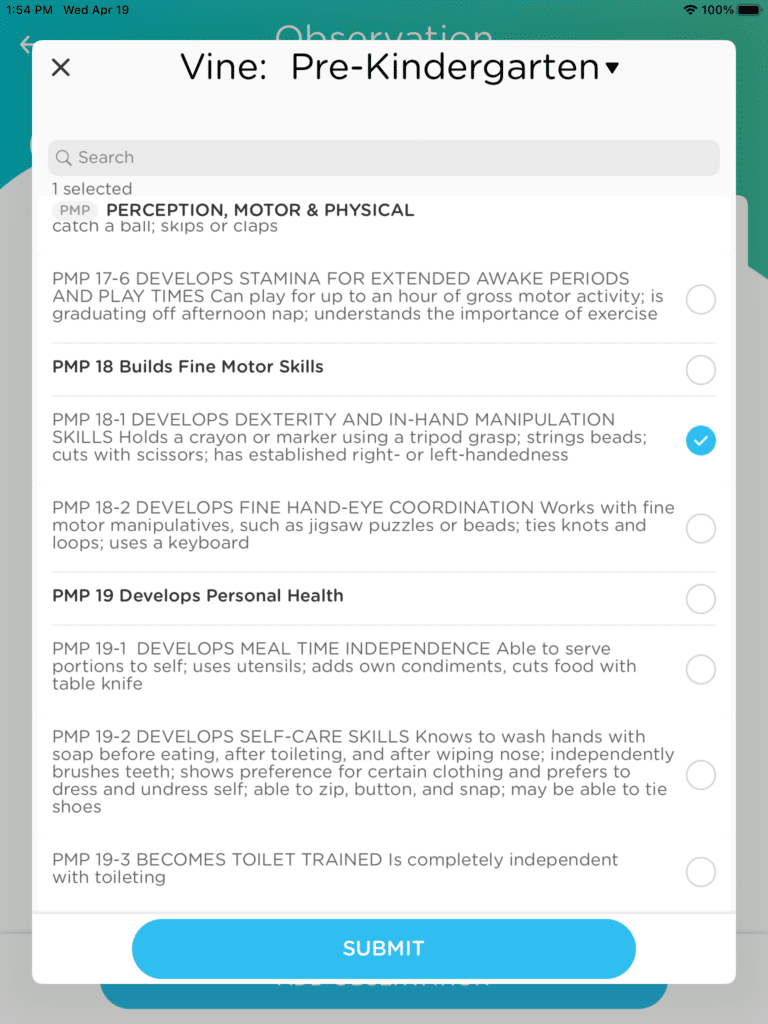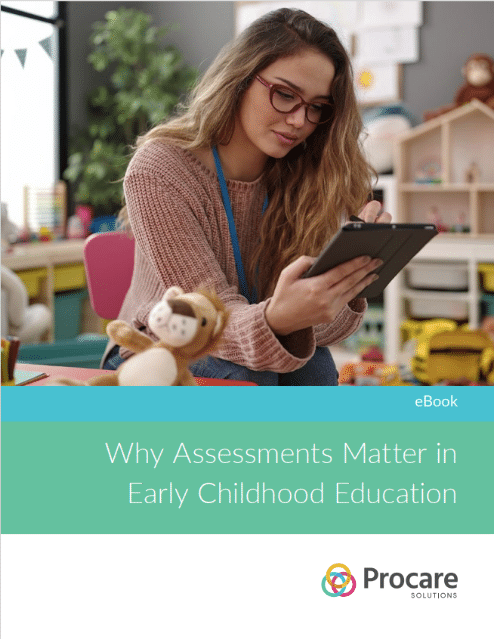
As child care centers struggle with staffing, and many are hiring less-experienced teachers than they previously would’ve considered, it can be difficult to ensure that assessing children through early childhood education assessments is being done correctly and accurately.
Understanding such assessments is important. Let’s take a look at five common questions with answers from Christine DeSanti, a Procare Solutions product manager who previously served as a director, assistant director and lead teacher in child care centers and holds a bachelor of science degree focused in early childhood education and teaching from Ohio State University.
1: Why do assessments matter for young learners?
Assessments matter for young learners because they provide valuable information about student progress, inform instructional strategies, identify learning gaps, monitor individual and group performance, promote accountability and support college and career readiness. Early childhood assessments serve as an essential tool for educators to guide their teaching practices and ensure that all students receive the support and resources they need to succeed academically.
2. What are the benefits of assessments in early childhood education?
Assessments provide a way to measure the progress and growth of young learners. They help educators and parents understand how well students are mastering the knowledge, skills and concepts being taught. Assessments offer valuable feedback on areas where students excel and areas where they may need additional support or intervention.
By identifying the strengths and weaknesses of individual students, educators can adjust their teaching approaches, provide targeted interventions and offer differentiated instruction to ensure that all students have the opportunity to succeed.

Christine DeSanti
ECE assessments enable educators to monitor the performance of both individual students and groups of learners. They provide valuable data that can be used to track the progress of each student over time and compare their performance with that of their peers. This information can help identify patterns, trends or areas of concern that may require adjustments to instructional practices or curriculum.
And assessments promote accountability for both students and educators. For students, assessments provide opportunities to demonstrate their understanding and knowledge, encouraging them to take ownership of their learning. For teachers and schools, assessments serve as a means of evaluating the effectiveness of instructional methods and curricula, helping identify areas for improvement and driving educational reform.
3. How can technology help ECE teachers conduct assessments?

Technology can play a significant role in helping early childhood education teachers conduct assessments more effectively and efficiently.
Digital assessment tools often include preloaded assessment frameworks, checklists and rating scales that teachers can use to observe and document children’s developmental progress. These digital tools make it easier to collect and analyze assessment data, allowing teachers to track individual student progress over time.
Technology enables the creation of online portfolios for each child for teachers to document observations, work samples, photos and videos. These portfolios provide a comprehensive view of a child’s learning and development, allowing teachers to assess progress and share this information with parents and other stakeholders easily.
Technology can assist in analyzing assessment data and generating reports. By using specialized software or online platforms, teachers can quickly analyze individual and group-level data, identify patterns, and gain insights into student progress. This helps teachers make informed decisions about instructional strategies and interventions.
With the rise of remote learning and hybrid models, technology enables ECE teachers to conduct assessments even when students are not physically present in the classroom. Video conferencing tools and digital assessment platforms allow teachers to engage with students remotely, observe their behavior, and conduct assessments through virtual interactions.
Technology can facilitate adaptive assessments that dynamically adjust the difficulty level of questions or tasks based on a child’s responses. This personalized approach ensures that each child’s abilities and progress are accurately assessed, providing a more accurate picture of their strengths and areas for improvement.
Learning management systems, messaging apps and digital communication platforms enhance collaboration and communication between teachers, parents and other stakeholders. Sharing assessment data, progress reports, and observations becomes more convenient, enabling ongoing dialogue and partnership in supporting a child’s development.
When using technology for assessments, it is crucial to consider data privacy and security measures. Teachers should choose platforms and tools that comply with relevant regulations and guidelines to protect sensitive student information.
Free eBook
Why Assessments Matter in Early Childhood Education
Download the “Why Assessments Matter in Early Childhood Education” eBook to learn why assessing children is of the utmost importance and how Procare offers an integrated proprietary early childhood assessment that’s aligned with state standards for children from birth to 5 years old at no additional cost.
4. What are the most difficult aspects of conducting assessments on young learners who are so varied in their learning styles/milestones?
Each young learner is unique, with different learning styles, abilities and developmental milestones. It can be challenging to create assessments that cater to this wide range of individual differences. Designing assessments that accommodate diverse learning needs and preferences is essential but requires careful planning and consideration.
Ensuring the validity and reliability of early childhood education assessments is crucial to obtain accurate and meaningful results. However, when dealing with young learners with varying learning styles and milestones, it can be difficult to create assessments that capture the full range of their abilities and provide consistent results. Striking a balance between assessing what is essential and being sensitive to individual differences can be challenging.
Selecting appropriate assessment methods that accommodate diverse learning styles can be demanding. Some learners may excel in written assessments, while others may perform better with hands-on or visual activities. Incorporating a variety of assessment methods, such as observations, portfolios, projects, and interviews, can help address these challenges, but it requires careful planning and implementation.
And assessing young learners with varied learning styles and milestones can be time-consuming and resource intensive. It may require additional time for individualized assessments, tracking progress, and analyzing results. Adequate resources, such as trained assessors, materials, and tools, need to be allocated to ensure accurate and comprehensive assessments.
Assessments of young learners are often subjective due to the involvement of human judgment. Interpreting and evaluating the performance of diverse learners can be subjective, leading to potential biases. It is essential to establish clear assessment criteria, provide assessor training and maintain consistency in scoring to mitigate subjectivity and ensure fairness.
When conducting assessments on young learners, it is crucial to consider ethical aspects. Assessments should be age-appropriate, culturally sensitive and conducted in a supportive and non-threatening environment. Respecting privacy, obtaining informed consent, and ensuring confidentiality are also critical factors that need careful attention.
To address these challenges, it is recommended to use a combination of formative and summative assessments, gather multiple sources of evidence, and employ flexible assessment strategies. Additionally, involving parents, teachers, and other professionals who work closely with the young learners can provide valuable insights and help create a holistic assessment approach.
5: Why are ECE assessments such a strong selling point to centers seeking to grow their enrollment?
Assessments serve as a strong selling point for centers seeking to grow their enrollment by demonstrating quality, offering a personalized approach, measuring progress, ensuring transparency and accountability, enabling benchmarking and comparison and providing early intervention and support.
They are a tangible way for centers to demonstrate their commitment to quality education. By offering assessments, centers can showcase their focus on individualized learning, academic standards and the overall educational development of their students. This can attract parents who prioritize a strong educational foundation for their children.

Assessments allow centers to tailor their teaching methods and curriculum to the specific needs of each student. By identifying a student’s strengths and areas for improvement through assessments, centers can create personalized learning plans that cater to their individual requirements. This personalized approach appeals to parents who want their children to receive targeted instruction and support.
By regularly assessing students’ skills and knowledge, centers can track their development and demonstrate tangible improvement. This progress monitoring is appealing to parents as it reassures them that their child is making academic strides and receiving a high-quality education.
Centers that offer early childhood education assessments demonstrate transparency and accountability in their educational processes. By conducting assessments, they provide parents with objective information about their child’s academic performance and areas that may need attention. This transparency helps parents make informed decisions about their child’s education and builds trust in the center’s commitment to their child’s progress.
By using standardized assessments or providing comparative data, centers can show how their students’ performance compares to national or international standards. This can highlight the center’s competitiveness and reassure parents that their child is receiving a high-quality education that aligns with broader academic standards.
And assessments can identify potential learning difficulties or gaps in knowledge at an early stage. Centers that offer assessments can provide targeted interventions and support services to address these challenges promptly. Parents appreciate the proactive approach to addressing their child’s educational needs, leading to increased enrollment in such centers.
How Vine Assessments Can Help

Software can track a child’s developmental growth, benefiting your center and the children you serve.
Procare Solutions is the only provider of child care management software to offer integrated proprietary early childhood assessments for children from birth to 5 years old at no additional cost with Vine Assessments.
Vine Assessments is an integrated framework that gives early childhood educators a way to clearly articulate the growth and development of children in their care. Its assessments align with standards in all 50 states. Teachers using Procare can tie their lessons and observations directly to the appropriate Vine Assessments indicator from the web-based software and Procare child care mobile app.
Download “Why Assessments Matter in Early Education,” a free eBook that will answer more of your questions and get you ready to include assessments in your child care program!




